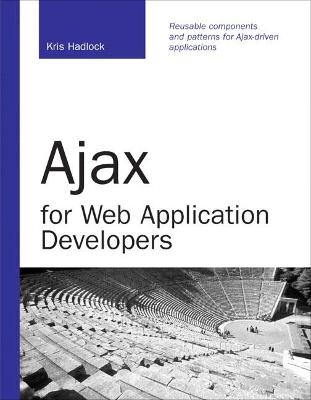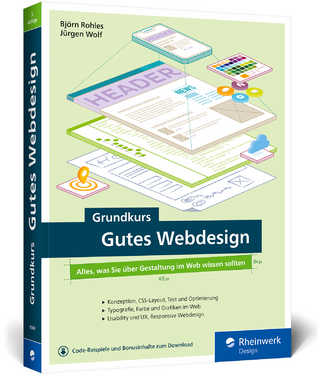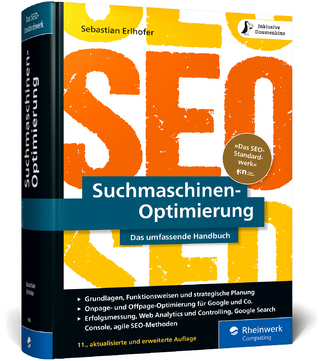
Ajax for Web Application Developers
Sams Publishing (Verlag)
978-0-672-32912-8 (ISBN)
Reusable components and patterns for Ajax-driven applications
Ajax is one of the latest and greatest ways to improve users’ online experience and create new and innovative web functionality. By allowing specific parts of a web page to be displayed without refreshing the entire page, Ajax significantly enhances the experience of web applications. It also lets web developers create intuitive and innovative interaction processes.
Ajax for Web Application Developers provides the in-depth working knowledge of Ajax that web developers need to take their web applications to the next level. The book shows how to create an Ajax-driven web application from an object-oriented perspective, and it includes discussion of several useful Ajax design patterns.
This detailed guide covers the creation of connections to a MySQL database with PHP 5 via a custom Ajax engine and shows how to gracefully format the response with CSS, JavaScript, and XHTML while keeping the data tightly secure. It also covers the use of four custom Ajax-enabled components in an application and how to create each of them from scratch.
The final section of the book combines the individual code examples and techniques from earlier chapters of the book into one larger, Ajax-driven application—an internal web mail application that can be used in any user-based application, such as a community-based web application. Readers will learn not only how to create and use their own reusable Ajax components in this application
but also how to connect their components to any future Ajax applications that they might build.
Web Development/Ajax/JavaScript
Kris Hadlock has been a contract web developer and designer since 1996. He is a featured columnist and writer for InformIT and numerous web design magazines. He is also the founder of Studio Sedition, a web application development firm, and is the cofounder of 33Inc, the company responsible for DashboardHQ. He maintains a blog called Designing with Code, which focuses on web application development from a design perspective and often features useful code snippets to help enhance web applications.You can find all of the above and more about Kris on his website at www.krishadlock.com.
Introduction
An Introduction to the Book Samples
I: Getting Started
1 Introduction to Ajax
The XML DOM
Measuring the Benefits
2 The Request
An In-Depth Look at XMLHttpRequest
A Standard XHR
A Database-Enabled XHR
Sending Data to a Database-Enabled XHR
Creating the Object
Asynchronous Data Transfers
The Ready State
HTTP Status Codes and Headers
3 The Response
XML
Elements
Attributes
CDATA
Parsing XML
JSON
The Syntax
Using JSON
Parsing JSON
4 Rendering the Response with XHTML and CSS
XHTML
CSS
II: Creating and Using the JavaScript Engine
5 Object-Oriented JavaScript
Object-Oriented Approaches
Using the new Operator
Literal Notation
Associative Arrays
JScript.NET
Object Constructors
Instances
Properties
Methods
Prototypes
Instances
Creating Properties
Overriding and Overwriting Properties
Property Protection
Methods
Extending Objects with Prototyped Methods
6 Creating the Engine
Creating a Custom Ajax Wrapper
Making Requests
The Ready State
The Response
Creating an Ajax Updater
Constructing the Object
Updating the Request Object
The Response
7 Using the Engine
Getting Started
Making a Request
Engine Methods and Properties
8 Debugging
The JavaScript onerror Event
responseText
IE Developer Toolbar
Installing the Plug-in
Disabling the Cache
Navigating the DOM
Viewing Class and ID Information
Safari Enhancer
Installing Safari Enhancer
The JavaScript Console
FireBug
Installing FireBug
The Command Line
Logging Messages in the Console
Levels of Logging
Inspecting Elements
Spying on Ajax
9 Extending the Engine
Creating a Utilities Object
Handling Status Codes with an HTTP Object
HTTP Status Code Categories
Using the HTTP Object
III: Creating Reusable Components
10 Accordion
Getting Started
The XML Architecture
Requesting the XML
Creating the Accordion Object
Panel Functionality and Data Display
Creating the CSS
11 Tree View
Structuring the Data
Handling the Response
Rendering the GUI
Adding Style to the Component
12 Client-Side Validation
Getting Started
Creating a Validation Object
Validating User Input
Providing Visual Feedback
The Server Side
The Constructor
Verifying User Information
Registering and Logging In a User
13 Data Grid
Getting Started
Creating a DataGrid Object
Displaying the Data
Creating a DataRow Object
Creating a DataColumn Object
Adding Design to the Component
IV: AJAX Patterns
14 Singleton Pattern
An Overview of the Singleton Pattern
Creating an Object Using the Singleton Pattern
Using the Singleton Object
15 Model View Controller
An Overview of the Pattern
Creating the Pattern
Using the Pattern
16 The Observer Pattern
Pattern Overview
Register Observers Overview
Notify Observers Overview
Unregister Observers Overview
Creating an Error-Handling Object
Register Observers
Notify Observers
Unregister Observers
Using the Error-Handling Object
17 Data Reflection Pattern
An Overview
The Multi-User Pattern
Creating the Pattern
18 Interaction Patterns
Creating a History with Cookies
The Historian Object
Creating and Displaying the XML
The Navigation Object
Drag and Drop
The DragDrop Object
19 Usability Patterns
Handling Feedback, Errors, and Warnings
Designing with Code
V: Server-Side Interaction
20 Understanding Ajax Database Interaction
Connecting with PHP
Bridging the Gap
Making the Requests
Making the Connection
21 Interacting with a Database: The Server-Side
Connecting to ASP.NET
Connecting to ColdFusion
22 Advanced Ajax Database Interaction
Bulk Updates
Sending Arrays
Sending XML
Sending JSON
Server-Side XML and JSON
XML
JSON
VI: Finishing Touches
23 Securing Your Application
Security Holes
Password-Protecting Ajax Requests
Creating Unique Passwords
Verifying Passwords on the Server-Side
24 Best Practices
Using the Engine
Design Patterns
Using Components
Static Versus Dynamic Responses
Error and Feedback Handling
Application History
Security
0672329123, TOC, 9/25/2006
| Erscheint lt. Verlag | 9.11.2006 |
|---|---|
| Reihe/Serie | Developer's Library |
| Verlagsort | Indianapolis |
| Sprache | englisch |
| Maße | 179 x 229 mm |
| Gewicht | 450 g |
| Themenwelt | Informatik ► Web / Internet ► Web Design / Usability |
| ISBN-10 | 0-672-32912-3 / 0672329123 |
| ISBN-13 | 978-0-672-32912-8 / 9780672329128 |
| Zustand | Neuware |
| Informationen gemäß Produktsicherheitsverordnung (GPSR) | |
| Haben Sie eine Frage zum Produkt? |
aus dem Bereich


